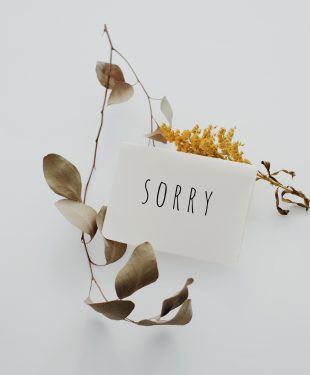Today we want to talk about the art of saying sorry: 5 tips for repairing burned bridges. Everyone makes mistakes, but not everyone knows how to apologize for them. Maybe you were in a heated situation with a loved one and exchanged unintentionally nasty words, or perhaps you forgot an important date and missed a friend’s birthday or an anniversary. Regardless of the situation, losing a meaningful relationship is painful for both parties. While it may take time and some hard work, re-building a relationship and re-establishing trust is well worth the effort. Truly learning and understanding what it means to make amends is a value that will help you maintain your relationships and prevent bridges from being burned.
Take time for self-reflection

Photo by on Pexels
A genuine apology can’t come from a quick desire to simply avoid further conflict. Take the time to sit and reflect on the situation. You must genuinely accept responsibility for your actions and the way you reacted afterward. Dig deep and look inward for an explanation as to why these events unfolded. That way, you can make strides in understanding why you may have made the mistakes you did. During this time of self-reflection, apologize to yourself and forgive as well. This act of grace will allow you to approach your apology with empathy and authenticity.
Make the first move
Stepping forward to make the apology is arguably the most challenging part of the process. Making the first move is a vulnerable place to occupy, but someone has to move the relationship along the path to healing. Rather than hoping for the right time or right place to initiate the first conversation, arrange for some intentional time to connect with the other person. Make it clear that you will devote this time to making amends, not assigning blame or throwing around accusations. Setting the intention for the conversation will ensure that your meeting will be productive. This is the best way to practice the art of saying sorry.
Take ownership

Photo by on Pexels
During your self-reflection, you should have worked to accept responsibility for your behavior and actions. When you are ready to apologize to the other party, it’s vital to take ownership again and verbally acknowledge that you messed up. During this part of the apology, try to empathize with your friend or loved one. Put yourself in their shoes and imagine if someone caused you pain. Express to the other person you understand that what you did hurt them. While taking ownership, it’s okay to explain yourself, but don’t twist your explanation into an excuse. Matter-of-factly stating your feelings is an excellent way to approach making an explanation.
Try to make amends
When practicing the art of saying sorry, it’s essential to come with a concrete plan to make amends, regardless of whether the other party expects you to compensate for the situation. Depending on the context of the conflict, you may not be able to offer a complete re-do of what happened or fully make up for your actions. Rather than making empty promises or meaningless grand gestures, genuinely provide a plan to fix things and emphasize that the other party ultimately determines how you can mend your relationship.
Don’t make the same mistake again
An apology isn’t authentic if you make the same mistake again. You will also damage trust in the relationship by repeating the same behaviors and actions. Hold yourself accountable by verbalizing your plan to prevent the situation from happening again and allowing the other person to feel comfortable holding you accountable. By sticking to this plan, you’ll demonstrate the art of saying sorry that you’ve learned from the situation and are genuinely remorseful.
The bottom line
Sometimes, a simple “I’m sorry” will rectify a situation, but a truly effective apology means digging much deeper and begin healing any hurt. Apologizing is an emotionally charged act and takes strength and vulnerability. Have grace for yourself and the other person, and your relationship can withstand this trial.
Read more lifestyle and self improvement articles at ClichéMag.com
Images provided by Creative Commons, Flickr, Unsplash, Pexels & Pixabay




